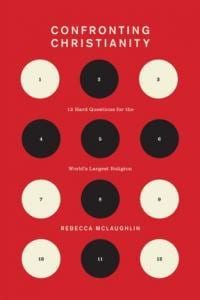 If there is a single question that has stood the test of time it is the problem of pain. How could a loving God allow so much inherent pain and suffering? The question has stood the test of time because answers are neither easy or straightforward. Rebecca McLaughlin addresses this question in chapter 11 of her book Confronting Christianity: 12 Hard Questions for the World’s Largest Religion. She has no knock down answer, but does offer some thoughts worth considering.
If there is a single question that has stood the test of time it is the problem of pain. How could a loving God allow so much inherent pain and suffering? The question has stood the test of time because answers are neither easy or straightforward. Rebecca McLaughlin addresses this question in chapter 11 of her book Confronting Christianity: 12 Hard Questions for the World’s Largest Religion. She has no knock down answer, but does offer some thoughts worth considering.
First, she doesn’t find the atheist option any improvement on Christianity. To take this approach is to resign oneself to an ephemeral existence with no real meaning. “We are just children making sandcastles in the face of a relentless tide. Or rather, we are not children. We are computers with delusions of personhood. … If there is no God, we still suffer, but there is no “universe” to care. There is no design, no purpose, no evil, no good – nothing but blind, pitiless indifference.” (p. 195)
The Buddhist approach of detachment, breaking the ties of attachment, offers little solace, and removes many of the greatest joys in life. It avoids disappointment, but at what cost. “To love is to be vulnerable. To desire and strive is to risk disapointment. … But they can also bring treasures nonattachment cannot find.” (p. 197)
Christianity tells a story. It has a beginning in creation and a consummation in New Jerusalem. “The loving, omnipotent God of our imagination would move swiftly from creation to new creation, from the garden of Eden of Genesis to the heavenly Jerusalem of Revelation.” (p. 204) But this isn’t the story we have. We are not living in some kind of nightmarish detour – with a God who needs to get the world back on track. Rebecca elaborates: “Jesus’ death is no accident. It is not even plan B. It is the lynchpin around which all human history revolves, the central peg of reality itself.” (p. 204)
So why the story line we live, with pain and suffering, doubt and anguish? Some will suggest that free will is an essential part of the plan. The freedom to follow without compulsion. Perhaps so, but this alone is not enough. I have favored the idea that growth to maturity as individuals and as a people of God is a necessary part of God’s plan. Maturity and wisdom require space to grow and to be tested. Rebecca has a slightly different take that emphasizes relationship. A strong relationship with God and with each other requires living through trying experiences together. Without fellowship in life including suffering the characters in a story (including our real-life story) cannot really bond and grow. God in the incarnation, life, death, and resurrection of Jesus, enters into the fabric of our lives. Alongside as well as Father Almighty and Creator.
Rebecca uses John 11, the story of Lazarus’ death and resurrection, to frame the discussion.
“Lord,” Martha said to Jesus, “if you had been here, my brother would not have died. But I know that even now God will give you whatever you ask.”
Jesus said to her, “Your brother will rise again.”
Martha answered, “I know he will rise again in the resurrection at the last day.”
Jesus said to her, “I am the resurrection and the life. The one who believes in me will live, even though they die; and whoever lives by believing in me will never die. Do you believe this?”
“Yes, Lord,” she replied, “I believe that you are the Messiah, the Son of God, who is to come into the world.” (11:21-27)
Jesus turns the discussion from Lazarus and his condition, from the grief of Martha and the other mourners, to himself as the Messiah, the resurrection and the life. We have ultimate promises for the future, but in the present Jesus lives alongside and with us through the ups and downs. In the story of Lazarus he wept with and for the family. This builds mature and strong relationships of dependence that cannot come through existence in a utopian garden transformed into a city.
Perhaps suffering and the uncertainties of life are a necessary part of God’s plan and of the Christian story.
Thoughts?
Could suffering be a necessary part of God’s plan?
If you wish to contact me directly you may do so at rjs4mail[at]att.net
If interested you can subscribe to a full text feed of my posts at Musings on Science and Theology.
The link to the book above is a paid link. Go with this one if you prefer: Confronting Christianity.












